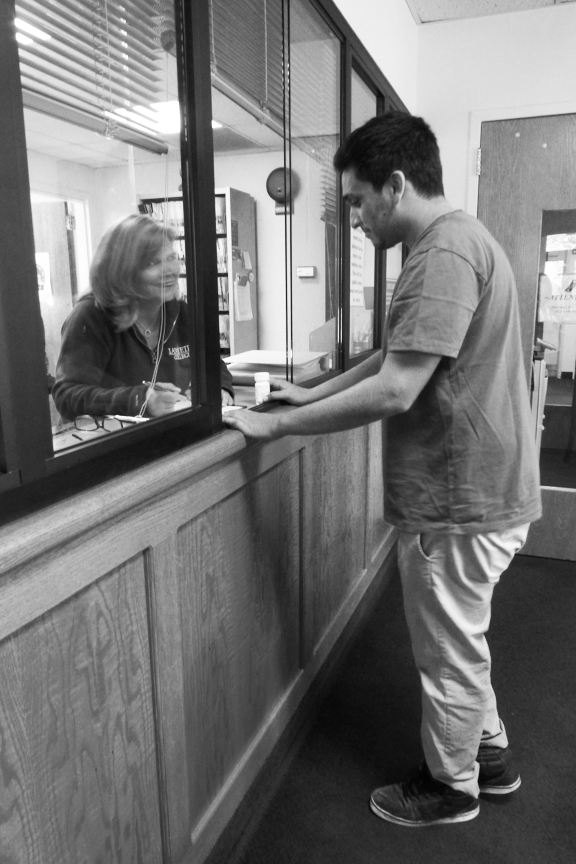A student speaks to receptionist at the Bailey Health Center.
Some students experience “disconnect” between themselves and Health Services
By Ian Morse ‘17 and Ryan Zhang ‘18
Collaborative Writers
Photo by Sun Yuchen ‘18
As Peter Auvil ‘15 was preparing to return home for Thanksgiving with his family, he felt sick.
“I had broken out in 103 degree fever, but I didn’t want to go to the hospital because I had a midterm,” he said. “I woke up and it was not any [better]…I just couldn’t move.”
Taking the midterm in his state was out of the question, so Auvil picked up the phone for Bailey Health Center but was refused a Dean’s Excuse over the phone. After he scheduled an appointment for later that day, he met with Director of Health Services Dr. Jeffrey Goldstein who was able to give him a Dean’s Excuse.
Auvil called this a “disconnect” between the students and health service employees. The person who answered the phone had told him a Dean’s Excuse was not possible, although the ultimate decision rests with Goldstein.
The rest of the employees said they would not give him a Dean’s Excuse, Auvil recalled, because it was only a fever.
The school’s policy is that Dean’s Excuses will be given only when students have “major” physical or psychological problems as evaluated by an appointment with Goldstein.
Goldstein recognizes that students may sometimes misinterpret the decision-making process over the phone.
“There might be a feeling that students are getting stonewalled over the phone,” he said. “That is why I encourage students to try to make it in, because I think that is their best shot at trying to get a Dean’s Excuse.”
Toby Mullarkey ‘17 was also turned down a Dean’s Excuse before speaking with Goldstein. After a dinner with his parents last year, Mullarkey got food poisoning and was sick throughout the night. When he slept through an exam due to the sickness, he rang the health center.
“I talked to receptionist and she said I was not going to be able to get a Dean’s Excuse unless I came in for appointment,” Mullarkey said, “but I wasn’t sick so I couldn’t come in for appointment.
“I called her back later and made an appointment with Dr. Goldstein and he looked at me and said ‘you are good to go and here is your dean’s excuse,’” he said.
Goldstein believes students should not feel deterred from making an appointment if they are told they might not receive a Dean’s Excuse.
“[People who answer the phone] can give their opinion over the phone that this is not a Dean’s excusable problem,” Goldstein said, “but at the end of the day…those decisions reside with either myself, the [physician’s assistants], the nurse practitioners, or midlevel providers.”
Goldstein believes that while a strict policy is required to prevent too many excused absences, a certain amount of flexibility is required to satisfy student needs.
“We try to set the bar relatively high and…create a threshold of severity of illness that would require a Dean’s Excuse,” he said. “We try to be consistent on one hand but also flexible with students.”
Auvil, who has twice experienced the system of receiving Dean’s Excuses in emergencies, sees room for improvement in the system.
“[The people who answer the phone] can just tell you ‘you can come and try to get a Dean’s Excuse but I don’t know how it is going to go but I can book you for that appointment,’” Auvil said. “That is much more encouraging for the kids to go see the doctor.”

























































































































